Showing 25 of 765 items meeting your criteria.
| | Type | Category | Supplier | |
|---|
| |
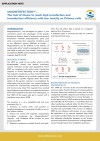 | Magnetofection™ was developed to gather, in one convenient system, the advantages of the popular biochemical (cationic lipids or polymers) and physical transfection methods (electroporation, gene gun) while overcoming their respective limitations such as low efficiency, toxicity, and difficulty in handling. Magnetofection can be defined as the delivery of nucleic acids, either naked or packaged (in complexes with lipids or polymers, and viruses), using magnetic nanoparticles (MNP) under the guidance of an external magnetic field. |
Documents | Transfection | Oz Biosciences | |
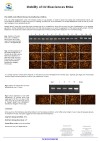 | RNA can suffer degradation when not handled, stored, or used properly. In order to assess how stable OZ Biosciences mRNA is, they have tested a randomly chosen RNA from their catalogue, Tomato RNA, and submitted it to several freeze/thaw cycles as well as mid-term storage at room temperature (RT). |
Documents | RNA | Oz Biosciences | |
| Leadgenes manufacturing capabilities include the production of a broad array of high-quality recombinant proteins, inclusive of a comprehensive human cytokine panel designed for immunology and cancer research. In addition, they also provide GMP-grade proteins from their ISO 13485 certified facility. These GMP-grade proteins are ideally suited for studies involving ex vivo cellular expansion, polarisation, or differentiation. |
Videos | Proteins | LeadGene Biomedical | |
| Leadgene Biomedical is at the forefront of recombinant proteins and antibodies production, setting a benchmark in the industry. They take pride in their ISO13485 and QMS (GMP) certifications, symbols of their unwavering commitment to quality and compliance. Their portfolio includes a wide range of reagents and ancillary materials vital for protein development, molecular biology, and immunology studies. This encompasses protease, enzymes, DNA amplification reagents, and cytokines. With a relentless focus on innovation and a passion for excellence, they strive to provide their clients with unparalleled products and services, forging a pathway to discoveries and breakthroughs in biomedical science. Trust in Leadgene, where cutting-edge technology meets quality and integrity. |
Videos | Catalogue | LeadGene Biomedical | |
| Leadgene Biomedical, a premier protein and antibody manufacturer, specialises in In Vitro Diagnostic (IVD) assays and provides raw materials, contract research, and cell line development.
Leadgenes indoxyl sulfate ELISA kit for chronic kidney disease diagnosis is famous for its highly sensitive characteristic, cost-effectiveness, and verified through CE-IVD certification.
Their innovative lyophilisation technology allows room-temperature storage and shipping of IVD assay reagents. Adhering to ISO 13485 and GMP guidelines, Leadgene produces a range of materials in state-of-the-art facilities.
Partnering with Leadgene offers a top-tier choice for assay development and protein production. |
Videos | Catalogue | LeadGene Biomedical | |
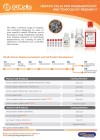 | iXCells offers a diverse range of hepatic cell products designed to cater to your specific needs. Whether youre focused on drug metabolism studies, liver disease research, or toxicology assessments, their catalogue of cells is tailored to accelerate your scientific discoveries. |
Documents | Primary Cells | iXCells Biotechnologies | |
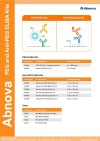 | Abnova provide a range of PEG and Anti-PEG ELISA Kits. |
Documents | ELISA | Abnova Corporation | |
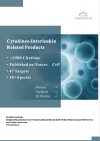 | Related products for Cytokines - interleukin |
Documents | Cytokines | Cloud-Clone Corp. | |
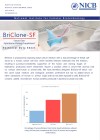 | Some researchers require a product which is serum-free and has had no contact with human or animal cells. We have, therefore, designed BriClone-SF which has the same basal medium and biological activities as BriClone but has no added serum or other substances of human or animal origin and has not been exposed to cells. BriClone-SF contains added recombinant human proteins produced in bacterial or yeast host cells. |
Documents | Cell Culture | NICB | |
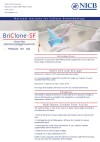 | Protocol for Use for BriClone-SF Hybridoma Cloning Supplement |
Documents | Cell Culture | NICB | |
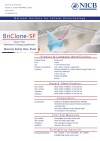 | Material Safety Data Sheet for BriClone-SF Hybridoma Cloning Supplement |
Documents | Cell Culture | NICB | |
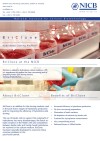 | BriClone is added to Hybridoma culture media as a 5% v/v supplement to replace the time-consuming task of preparing feeder cells during routine cloning of hybridomas. |
Documents | Cell Culture | NICB | |
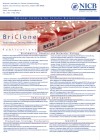 | BriClone has been cited in many publications over the years, and in a range of research areas. |
Documents | Cell Culture | NICB | |
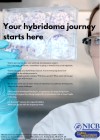 | NICB has over 25 years of experience in antibody development & developed BriClone, a supplement for improving fusion efficiency and supporting cloning outgrowth of hybridoma cells at those fragile early steps. |
Documents | Cell Culture | NICB | |
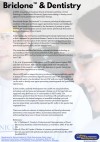 | In 2005, researchers in Graduate School of Dentistry and Dept. of Oral Pathology at Osaka Dental University (Japan) were seeking to develop novel agents for use in periodontal regeneration therapy. The researchers published two studies utilising hybridoma technology to successfully produce monoclonal antibodies (mAbs) against the rat periodontium (RPT1) and the human cemento-periodontal ligament junction (anti-TAP). |
Documents | Cell Culture | NICB | |
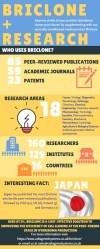 | An overview of the research applications of BriClone Hybridoma Cloning and Selection Supplement. |
Documents | Cell Culture | NICB | |
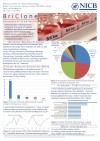 | BriClone has been manufactured onsite for over 25 years by research scientists at the publicly-funded National Institute for Cellular Biotechnology, (Dublin City University, Dublin, Ireland) and has a long history of application in research internationally. |
Documents | Cell Culture | NICB | |
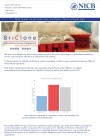 | BriClone is an additive for the cloning medium used in the post-fusion stages of hybridoma production and for improving the efficiency of hybridoma cells cloning.
To demonstrate the stability of BriClone, various simulated conditions were assessed mimicking different temperature exposures.
Post-fusion hybridoma production was assessed using BriClone under different conditions (overnight at room temperature) as a positive control, as well as one week stored at 4°C. |
Documents | Cell Culture | NICB | |
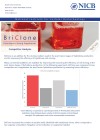 | BriClone is an additive for the cloning medium used in the post-fusion stages of hybridoma production and for improving the efficiency of hybridoma cells cloning.
Many commercial additives are available for improving the improving the efficiency of cell cloning at the post-fusion stages of hybridoma production. In the following experiment, BriClone was compared to two competitors as a supplement for post-fusion hybridoma production by assessing fusion efficiency. |
Documents | Cell Culture | NICB | |
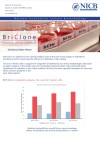 | BriClone is an additive for the cloning medium used in the post-fusion stages of hybridoma production and for improving the efficiency of hybridoma cells cloning.
The use of feeder cells to support the outgrowth of hybridomas has many disadvantages, like batch-to-batch variation of the feeder cells and competition between feeder cells and freshly-fused hybridomas for nutrients in the culture medium. BriClone has been specially developed to overcome these common problems in the post-fusion period. |
Documents | Cell Culture | NICB | |
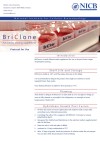 | Protocol for Use for BriClone Hybridoma Cloning Supplement |
Documents | Cell Culture | NICB | |
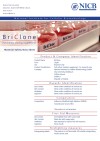 | Material Safety Data Sheet for BriClone Hybridoma Cloning Supplement |
Documents | Cell Culture | NICB | |
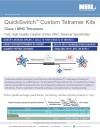 | The QuickSwitch™ Quant Tetramer Kit can quantify the exchange with the new peptide for epitope discovery and verify that the resulting new specificity tetramer is suitable for cell staining. This kit is optimised for 10 peptide exchanges and multiple tests per resulting tetramer. |
Documents | Tetramers | MBL | |
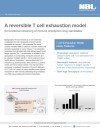 | A reversible T cell exhaustion model for functional screening of immune checkpoint drug candidates. |
Documents | | MBL | |
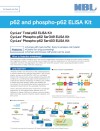 | MBLs p62 and phospho-p62 ELISA Kits come with a lysis buffer, are useful for drug screening and can be used with Human or Mouse cell lysate. |
Documents | ELISA | MBL | |